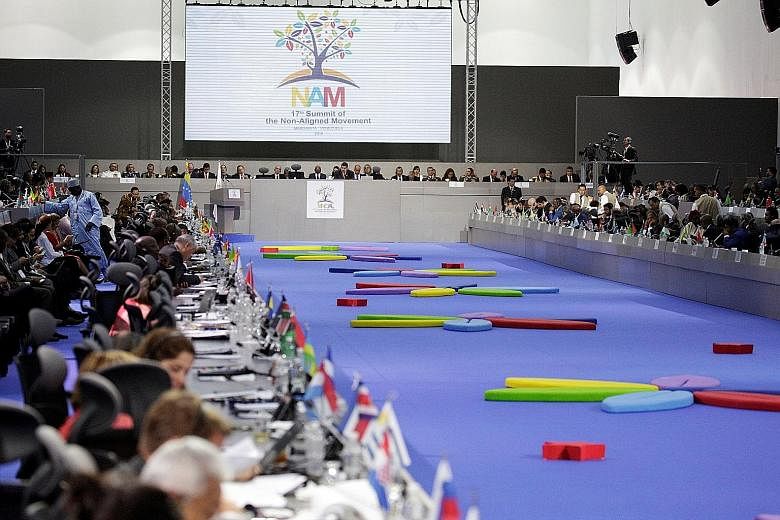Singapore was not alone in pressing for updates on the South China Sea issue to be made in the Final Document of the recently concluded Non-Aligned Movement (NAM) summit in Venezuela.
The Straits Times (ST) understands that several other countries did so as well, including Indonesia, a fellow Asean member. All 10 Asean countries are NAM members.
Indonesia, a founding member of NAM, had reached prior agreement with rotating chair Venezuela to include the proposed text drafted by Asean through consensus in the document, sources told ST.
-
Text disputes
-
Sept 15
Ecuador, as NAM facilitator for South-east Asia, makes counterproposals on behalf of unnamed countries to the proposed text on the South China Sea dispute drafted by Asean through consensus. When Ecuador refuses to name the countries despite being asked to do so, Asean members reject the counterproposals.
Sept 17-18
During the summit, Venezuela blocks discussions on the proposed text and instead adopts paragraphs from the 2012 final document. The move prompts countries like Indonesia and Singapore to raise objections.
Sept 18
Laos, as Asean chair, protests to Venezuela for rejecting the updates. It also writes to Venezuela's foreign minister to record Asean's reservations over the text in the final document that was not updated.
But after Ecuador blocked the proposed text on behalf of countries it would not name, Venezuela refused to let the 10-member Asean bloc table the issue for discussion. Instead, it adopted paragraphs that were in the final document of the last summit in 2012.
After Asean's efforts were rebuffed, the Indonesian delegation headed by Vice-President Jusuf Kalla spoke in objection during the summit.
Indonesia had also urged Laos, the current Asean chair, to raise objections to Venezuela for rejecting the proposed update and for disallowing any discussions at the summit, sources said.
Singapore had read out the entire proposed text at Laos' request as the latter did not have the documents on hand at the time, they added.
ST understands that the proposed text had contained references to Asean leaders' "serious concerns" over recent and ongoing developments in the South China Sea, such as land reclamation and increased presence of military assets. But it also noted recent progress made between China and Asean on managing the dispute.
The involvement of Singapore - represented by Senior Minister of State for Foreign Affairs and Defence Maliki Osman - at the NAM summit was reported by the Global Times newspaper on Sept 21.
It led to an exchange of letters earlier this week between Singapore Ambassador to China Stanley Loh and the newspaper, which is linked to the Chinese Communist Party.
The Sept 21 report, published in the paper's Chinese edition, claimed Singapore had insisted on adding contents which endorsed the Philippines' South China Sea arbitration case in the final document. It quoted sources as saying "the Singapore representative... made sarcastic remarks" on the stance of countries opposed to the move.
On Monday, Mr Loh, in a letter addressed to the paper's editor-in- chief Hu Xijin, said the "actions and words" attributed to Singapore in the Global Times report were "false and unfounded". He pointed out that it is a tradition in NAM for countries of a region to update their respective sections in the final document without external interference.
He asked that his letter be published in full in Chinese and English in the Global Times so that its "readers may be accurately informed".
On Tuesday, Mr Hu defended the report, which he said was written based on information from sources who are "serious and reliable".
He also suggested that Singapore should "do a reflection and not pin labels on the Global Times, which reported the real situation".
In his reply the same day, Mr Loh said, among other things, that the Global Times report did not accurately reflect the proceedings at the summit. He again asked for his first letter to be published.
Yesterday, Global Times published Mr Loh's first letter in full in its Chinese print edition, along with Mr Hu's response on Tuesday and the Sept 21 report.
NAM was formed in 1961 by a grouping of newly independent countries that did not want to take sides in the Cold War between the United States and the Soviet Union. It now has 120 members. China is an observer.
The exchange of letters has attracted the attention of some netizens here, with some questioning Global Times' credibility and others critical of Singapore's stance on the South China Sea issue.
A netizen with the nickname Beijing Lugong said on Weibo, a Chinese microblog site, that the daily and its editor should not claim to represent the Chinese people.
"The Chinese government did not authorise you and your newspaper to issue a statement on its behalf," he said.
But there were also those who said Singapore should stay out of the issue since it is a non-claimant state in the territorial dispute.
Media expert Qiao Mu told ST that he is not surprised by the Global Times report, as the paper is known for stirring up nationalistic sentiments among Chinese readers.

